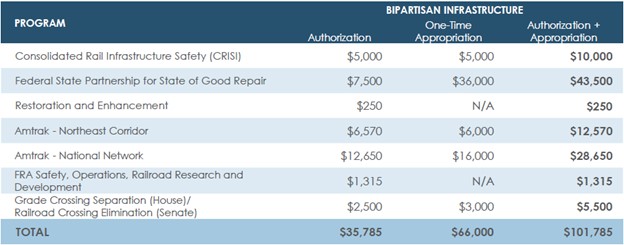Dear Riders,
Like many of you, I was thrilled by the recent passage of the Infrastructure Investment and Jobs Act (IIJA). I know that many of you are big supporters of the Capitol Corridor and of passenger rail more broadly, so I would like to give you more information on what this program means for our future.
Overall, it is hard to overstate the significance of this legislation to our service and the passenger rail industry. Historically, the Capitol Corridor has relied almost entirely on funds from the State of California for capital investments. With IIJA, we can now partner with the Federal government to dramatically enhance our service.
While Federal dollars have been available for many decades to support highway and transit investments, funds for intercity passenger rail have been limited. With this legislation, that situation has now fundamentally changed.
How will this new federal investment benefit the Capitol Corridor?
In many ways, our agency is ahead of others across the country in that we are already poised to take advantage of this new opportunity for investment in passenger rail.
We bring a solid relationship with our host railroads (Union Pacific and the Peninsula Corridor Joint Powers Board); state funding programs that provide a match to Federal investments; and a clear path for how we can invest in passenger rail as defined in our Vision Implementation Plan, as well as the California State Rail Plan.
Intercity Passenger Rail will receive a minimum of $10B more annually in federal funding.
At a minimum, the legislation provides $66B in intercity rail funding over five years, which comes out to more than $13B annually, with the potential for more than $100B. As a point of comparison, total rail funding in Fiscal Year 2021, not including COVID relief funds, totaled less than $3B.
The table below details intercity passenger rail programs in the legislation, including the five-year transportation bill authorization level of $35.78B (subject to annual budget appropriations), and the guaranteed one-time appropriation of $66B.
*Amounts shown below are in millions of dollars.
Which of these programs might benefit the Capitol Corridor?
The short answer is most of them. The first two programs listed – the Consolidated Rail Infrastructure Safety Program and Federal State Partnership for State of Good Repair – are two discretionary programs to which the Capitol Corridor may apply for funding.
Both these programs already exist, but with far fewer resources. Eligibility under the new legislation is relatively broad and will provide an opportunity for the Capitol Corridor to receive funds for a wide variety of projects.
This could include smaller improvements, like track siding to improve reliability, or more sizeable investments, like South Bay Connect, the Sacramento to Roseville Third Track Project, or the transformational Link21 Program. These larger projects will benefit not only Capitol Corridor riders, but anyone who travels in Northern California.
In addition, funds going directly to the Amtrak National Network also have the potential to benefit our service through investments in stations along our corridor, providing customers with a better experience and improved access.
I should also mention the newly created Grade Crossing Elimination Program, which has potential to substantially improve safety along our corridor. This has been, and will always be, one of our key priorities.
IIJA is a turning point for passenger rail.
In short, this legislation represents a turning point for intercity passenger rail in the United States. With this level of investment, we will have the opportunity to substantially grow and enhance the nation’s rail network. Your travel options by rail will improve, with connections to more cities, more frequent and reliable service, reduced travel times, better stations, and a more climate-friendly fleet.
I have no doubt that successful services like ours provided confidence to the Administration and to Congress as they considered these once-in-a-lifetime infrastructure investments. Now is our opportunity to build upon that success.
We appreciate your support of our service and look forward to making it even better.
All the best,
Rob Padgette
Managing Director
Capitol Corridor Joint Powers Authority


